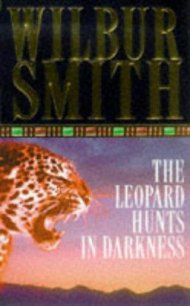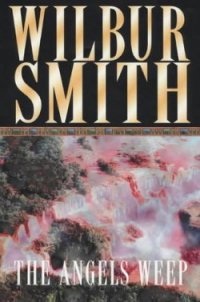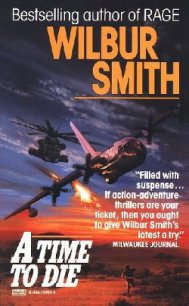Eagle in the Sky - Smith Wilbur (бесплатные версии книг .txt) 📗
fierce, and you don't want to be looking into them. David moved back
and Ruby adjusted the machine. A roll of graph paper began running
slowly under a moving stylus which settled almost immediately into a
steady rhythmic pattern. On a separate glass screen a moving green dot
of light began to repeat the same rhythm, leaving a fading trail across
the screen like the tail of a comet. It reminded David of the
interceptor radar screen on the instrument panel of a Mirage jet. Ruby
switched out the top lights, plunging the room into utter darkness,
except for the pulsing green dot on the screen.
Are we ready now, Debra? Look straight ahead, please. Eyes open.
Soundlessly a brilliant burst of blue light filled the room, and
distinctly David saw the green dot on the screen jump out of its
established pattern, and for a beat or two it went haywire, then settled
again into the old rhythm. Debra had seen the light flash, even though
she was unaware of it; the pulse of light had registered on her brain
and the machine had recorded her instinctive reaction.
The play with light went on for another twenty minutes while Ruby
adjusted the intensity of the light source and varied the transmissions.
At last he was satisfied, and turned the top lights up.
Well? Debra demanded brightly. Do I pass? 'There's nothing more I
want from you, Ruby told her. You did just great, and everything is the
way we want it. 'Can I go now? David can take you to lunch, but this
afternoon I want you at the radiologist's. My receptionist arranged it
for 2:30, I believe, but you had best check with her. Neatly Ruby
countered any attempt of David's to get him alone.
I shall let you know as soon as I have the X-ray results. Here, I'll
write down the radiologist's address. Ruby scribbled on his
prescription pad and handed it to David. See me alone tomorrow io a. m.
David nodded and took Debra's arm.
He stared at Ruby a moment trying to draw some reaction from him, but he
merely shrugged his shoulders and rolled his eyes in a music-hall
comedian's gesture of uncertainty.
The Brig joined them for lunch in their suite at the Mount Nelson, for
David still could not endure the discomfort of the public rooms. The
Brig drew upon some hidden spring of charm, as though sensing that his
help was needed, and he had both of them laughing naturally with stories
of Debra's childhood and the family's early days after leaving America.
David was grateful to him, for the time passed so quickly that he had to
hurry Debra to her appointment.
I am going to use two different techniques on you, my dear- David
wondered what it was about her that made all males over forty refer to
Debra as though she were twelve years old. First of all we will do five
of what we call police mug shots, front, back, sides and top - The
radiologist was a red-faced, grey-haired man with big hands and heavy
shoulders like a professional wrestler. We aren't even going to make
you take your clothes off - he chuckled, but David thought he detected a
faint note of regret. Then after that, we are going to be terribly
clever and take a continuous moving shot of the inside of your head.
It's called tomography.
We are going to clamp your head to keep it still and the camera is going
to describe a circle around you, focused on the spot where all the
trouble is. We are going to find out everything that's going on in that
pretty head of yours, I hope it doesn't shock you too much, doctor,
Debra told him, and he looked stunned for a moment, then let out a
delighted guffaw, and later David heard him repeating it to the sister
with gusto.
It was a long tedious business, and afterwards when they drove back to
the hotel, Debra leaned close to him and said, Let's go home, David.
Soon as we can? 'Soon as we can, he agreed.
David did not want it that way, but the Brig insisted on accompanying
David on his visit to Ruby Friedman the following morning. For one of
the very few times in his life David had lied to Debra, telling her he
was meeting with the Morgan Trust accountants, and he had left her in a
lime-green bikini lying beside the hotel swimming pool, brown and slim
and lovely in the sunlight.
Ruby Friedman was brusque and businesslike. He seated them opposite his
desk and came swiftly to the core of the business.
Gentlemen, he said. We have a problem, a hell of a problem. I am going
to show you the X-ray plates first to illustrate what I have to tell you
- Ruby swivelled his chair to the scanner and switched on the book-light
to bring the prints into high relief. On this side are the plates that
Edelman sent me from Jerusalem. You can see the grenade fragment. It
was stark and hard edged, a small triangular shard of steel lying in the
cloudy bone structure. And here you can see the track through, the
optic chiasma, the disruption and shattering of the bone is quite
evident. Edelman's original diagnosis, based on these plates, and on
the complete inability to define light or shape, seems to be confirmed.
The optic nerve is severed, and that's the end of it. Quickly he
unclipped the plates, and fitted others to the scanner. All right.
Now here are the second set of plates, taken yesterday.
Immediately notice how the grenade fragment has been consolidated and
encysted. The stark outline was softened by the new growth of bone
around it. That is good, and expected. But here in the channel of the
chiasma we find the growth of some sort that leaves itself open to a
number of interpretations. It could be scarring, the growth of bone
chips, or some other type of growth either benign or malignant. Ruby
arranged another set of plates upon the scanner. Finally, this is the
plate exposed by the technique of tomography, to establish the contours
of this excrescence. It seems to conform to the shape of the bony
channel of the chiasma, except here, Ruby touched a small half-round
notch which was cut into the upper edge of the growth, - this little
spot runs through the main axis of the skull, but is bent upwards in the
shape of an inverted U. It is just possible that this may be the most
significant discovery of our whole examination. Ruby switched off the
light of the scanner.
I don't understand any of this, the Brig's voice was sharp. He did not
like being bludgeoned by another man's special knowledge.
No, of course. Ruby was smooth. I am merely setting the background for
the explanations that will follow. He turned back to the desk, and his
manner changed. He was no longer lecturing, but leading with authority.
Now as to my own conclusions. There can be absolutely no doubt that
certain function of the optic nerve remains. It is still conveying
impulses to the brain. At least a part of it is still intact. The
question arises as to just how much that is, and to what extent that
function can be improved. it is possible that the grenade fragment cut
through part of the nerve, severing five strands of a six-strand rope,
or four or three. We do not know the extent, but what we do know is
that damage of that nature is irreversible. What Debra may be left with
is what she has now, almost nothing. Ruby paused and was silent. The
two men opposite him watched his face intently, leaning forward in their
seats.
That is the dark side, if it is true, then Debra is for all practical




